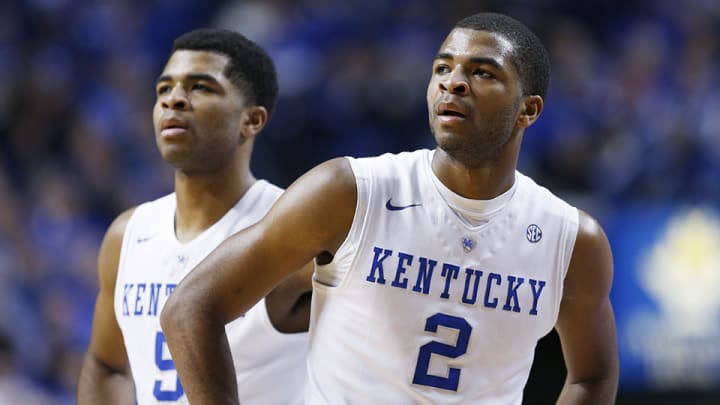Kentucky's Harrison twins enter NBA draft as major questions abound

CHICAGO—Andrew Harrison didn’t like the questions. Why would he? For weeks, Harrison and his twin brother, Aaron, Kentucky’s starting backcourt the last two seasons, have been asked why they didn’t return for a third. Draft projections have been consistent: At best, Andrew, the point guard, was a late first round pick; most likely, both would go somewhere in the second round.
So with two years of eligibility left, why take the risk? Why not go back to UK, improve and come out next year?
Theories abound. One: Family pressure.
“No family pressure at all,” Andrew said last month at the NBA draft combine. “I just felt like I was ready. I felt I accomplished what I wanted to in the college game. I matured over the two years and I felt I was ready. I felt I was the best point guard in the draft.”
Said Aaron, “I was ready to do all this and move on.”
- MORE NBA: Mock Draft | Johnson trajectory | Christmas's roots
Another: Minutes. Both Harrison’s saw diminished playing time last season. Next season, with Tyler Ulis already on board and high school star Isaiah Briscoe set to join him, those minutes could be cut even further. It’s life at Kentucky: For many, it’s play well, win, and move on. For those that are not one-and-done, every year after is a fight to stay in the rotation.
Was that a factor?
“No,” Andrew said.
Never thought about it?
“No,” Andrew said. “Never.”
Few fringe first round picks have been as polarizing as the Harrisons. Blue chip prospects in high school, the twins didn’t expect Kentucky to be much more than a pit stop. “I sent them to Kentucky because I think it's the best system to play basketball,” the father, Aaron Harrison Sr., told SI in 2013. “Let's not sugarcoat it and say they are going to be doctors.”
The Case For: Why NCAA basketball is the best route for future NBA players
But something happened at UK. Flaws became more focused. Weaknesses were exposed. They played in big games. They made big shots. But NBA scouts never saw a furthering of the lottery-level hype they had in high school.
The Kentucky spotlight became a blessing and a curse. Body language became scrutinized. Every scowl was presented as proof of a poor attitude. There are few reasons to believe either Harrison is a problem. Teams that have researched them have come up with similar stories. Well liked by teammates. Respected by coaches. And yet a cloud seems to hover over them. “If they went to Vanderbilt, no one would be talking about it,” says a GM. “They do play with a swagger. But it’s fascinating. They really do evoke hatred among some people.”
There is a thin line between confidence and arrogance and, several league executives say, the Harrison’s walk it. “Andrew’s interview [at the combine] was one of the worst we had,” says a team executive. “I wanted to like him. But he came across like we were bothering him.”
- MORE NBA: Towns Q&A | Tokoto full of surprises | Okafor or Towns?
Ultimately, of course, draft position is determined by talent. And through a series of draft workouts—some of which will continue into this week—team officials remain unsure about the Harrison’s future. Andrew is generally considered the brighter prospect. He’s a 6’6” point guard in a league with a growing number of super-sized playmakers with a solid midrange game. Athleticism, or a lack of it, is an oft-cited criticism, as is his three-point range. “He’s poised and better than I thought he would be,” says an Eastern Conference coach. “But I’m still not sure where he fits in the draft.”
Aaron is even more questionable. Teams love his fearlessness—who can forget the three game winners he made in the 2014 NCAA tournament—but poor three-point shooting numbers last season (31.6%) have scouts uneasy about his future. “To me, he’s a late second round pick,” says another GM. “And it wouldn’t surprise me if he goes undrafted.”
To their credit, the Harrison’s appear impervious to skeptics. At the combine, Andrew declared that he was the best player in the draft; Aaron said the brothers were the top guard prospects. Criticism only seems to fuel them.
“We really do think we’re the best guards in the draft,” Aaron said. “We both have chips on our shoulders.”
The NBA's No. 1 draft picks in the lottery era
The NBA's No. 1 Draft Picks in the Lottery Era
1985: Patrick Ewing
1986: Brad Daugherty
1987: David Robinson
1988: Danny Manning
1989: Pervis Ellison
1990: Derrick Coleman
New Jersey Nets
1991: Larry Johnson
1992: Shaquille O'Neal
1993: Chris Webber
Orlando Magic
1994: Glenn Robinson
1995: Joe Smith
1996: Allen Iverson
1997: Tim Duncan
San Antonio Spurs
1998: Michael Olowokandi
Milwaukee Bucks
1999: Elton Brand
2000: Kenyon Martin
New Jersey Nets
2001: Kwame Brown
2002: Yao Ming
2003: LeBron James
Cleveland Cavaliers
2004: Dwight Howard
Orlando Magic
2005: Andrew Bogut
Milwaukee Bucks
2006: Andrea Bargnani
2007: Greg Oden
2008: Derrick Rose
Chicago Bulls
2009: Blake Griffin
Los Angeles Clippers
2010: John Wall
Washington Wizards
2011: Kyrie Irving
Cleveland Cavaliers
2012: Anthony Davis
New Orleans Hornets
2013: Anthony Bennett
Cleveland Cavaliers
2014: Andrew Wiggins
Cleveland Cavaliers
2015: Karl-Anthony Towns

Chris Mannix is a senior writer at Sports Illustrated covering the NBA and boxing beats. He joined the SI staff in 2003 following his graduation from Boston College. Mannix is the host of SI's "Open Floor" podcast and serves as a ringside analyst and reporter for DAZN Boxing. He is also a frequent contributor to NBC Sports Boston as an NBA analyst. A nominee for National Sportswriter of the Year in 2022, Mannix has won writing awards from the Boxing Writers Association of America and the Pro Basketball Writers Association, and is a longtime member of both organizations.
Follow sichrismannix